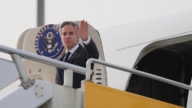【新唐人2013年10月09日讯】在印尼巴厘岛举行的“亚太经济合作会议(APEC)”8号闭幕,各经济体领袖发表领袖宣言,内容包括将支持持续推动多边贸易。中共国家主席习近平首次出席APEC峰会,并且借道访问印度尼西亚及马来西亚,这也是习近平就职主席以来的首次东南亚之行。对于美国总统欧巴马缺席这次“亚太经合组织峰会”,有媒体说,这可能会对美国的地位产生影响,中共因此获得更大的国际舞台空间。然而评论认为,东南亚这些国家与美国的关系,不会因为美国总统的一次缺席而改变局面,亚洲国家不会因此而重新站队。
为期两天的“亚太经合组织(APEC)”第二十一次领袖非正式会议,8号举行闭幕仪式,各经济体领袖也发表领袖宣言,表达将持续支持推动多边贸易。
成立于1989年的“亚太经合组织”现有21个成员国家或地区。今年的主题是“活力亚太、全球引擎”,3大议题为“实现茂物目标”、“达成公平的永续成长”、“促进连结”,并着重于推动“经济与技术合作”等能力建构的具体工作计划。
美国欧巴马总统因联邦政府关门,而没有参加这次峰会,有部分媒体描述﹕盟国对此大失所望。
美国政治学者冉伯恭博士认为,目前一些媒体过分渲染了美国没有参加这次峰会的影响,他表示,“中国主导APEC会议讨论,对中国、对习近平来说,是很好的机会。但是,这是暂时的现象,对美国的亚洲政策不会有长久影响。美国对亚洲的长期影响,不会因为欧巴马这次缺席会议有重大的改变。”
时事评论员蓝述:“我觉得这次欧巴马没有去参加亚太经济会议,一方面是因为美国国内现在出现了美国联邦政府出现关门的事情,另外他不去亚太高峰会议,主要是他对亚洲和太平洋地区国家跟美国的关系,他有充分的信心。”
美国国务卿克里(John Kerry)这次代表欧巴马出席会议时也强调,美国对亚洲的海事安全和贸易谈判的承诺不变。
事实上,美国总统因为联邦政府停摆而取消APEC年会行程,欧巴马并非第一人。1995年柯林顿也曾因为府会政争,而在APEC大阪峰会举行前夕,临时取消出席计划。
旅美中国问题专家陈破空:“我认为,欧巴马此行没有去,在国际形象上,虽然有一点影响,或者表面上解读为:中国元首可以去东南亚,美国元首没有去,中美较劲,好像是中国占了上风。但事实上,东南亚这些国家与美国的关系不会因此受到任何影响。美国的重返亚洲战略或在平衡战略也不会受到影响。”
旅美时事评论员陈破空在接受《法国国际广播电台》采访时表示,欧巴马取消APEC峰会,有“一箭双雕”的作用。因为美国前几年发起“泛太平洋战略经济伙伴关系协定(TPP)”,这个联盟已经取代了APEC峰会,而他这次未能出席APEC,实在是因为共和党未同意他提出的法案而走不开。陈破空认为,这是欧巴马的哀兵之计。
陈破空:“主要是因为中国(中共)现在不仅在南海、而且在东海及钓鱼岛,都与周围国家发生冲突。在这个时后,在亚洲国家形成了一个不信任的情绪。所以,亚洲国家基本上是远交近攻,就是他结交美国这样的大国,来保障亚洲的安全。所以,此次美国总统没有去,中国(中共)国家主席去了,没有改变一个根本的局面。就是说亚洲国家并不会因此而重新站队。”
据了解,美国正试图与11个亚太国家签署“泛太平洋战略经济伙伴关系(简称TPP)协议”,以推动美国的出口,占全球经济总量的近40%。这11个国家并不包括中国。一旦“TPP”定案,将创下美国史上最大规模的自贸协议。
采访/陈汉 编辑/黄亿美 后制/郭敬
What is the Impact of Obama’s Absence at the APEC Summit?
The Asia-Pacific Economic Cooperation (APEC) summit
held in Bali, Indonesia, concluded on October 8.
Each economic systems’ leader gave their statements.
The contents included continued promotion of multilateral trade.
Chinese President Xi Jinping attended the APEC summit
for the first time, and visited Indonesia and Malaysia en route.
This is his first trip to Southeast Asia since he took the office.
Regarding U.S. President Barack Obama’s absence,
some media say it might impact the U.S.’s position, and the
Chinese Communists Party (CCP) would gain greater space.
However, commentators say that relations between
Southeast Asian countries and the United States
will not change because of one absence of the U.S. President,
neither will the Asian countries change their position.
The closing ceremony of the 21st APEC’s two-day
economic leaders’ informal meeting was held on October 8.
Different countries’ economic leaders said that
they will continue to support and promote multilateral trade.
The APEC was founded in 1989 and its members include
21 countries and regions. This year’s theme is
“Resilient Asia-Pacific, Engine of Global Growth."
The three key discussions were “Realizing trade goals,"
“Reaching fair and sustainable growth," and “Promoting unity."
It also focused on promoting “Economic and technical cooperation"
and other specific work plans on capacity development.
U.S. President Barack Obama didn’t attend this summit
due to the closure of the federal government.
Some media reported that allies were very disappointed at this.
U.S. political scientist Dr. Ran Bogong says that some reports
exaggerated the impact of the U.S.’s absence at the summit.
He says “China leading the APEC meetings was a very good
opportunity for Xi Jinping. This is temporary.
It won’t have long-term consequences to U.S. policy in Asia.
U.S. long-term impact in Asia will not see significant changes
because of Obama’s absence of the summit."
Commentator Lan Shu: “Obama’s missing the APEC was due
to the closure of the federal government;
the U.S. is confident in it’s relationship with the APEC region."
U.S. Secretary of State John Kerry attended the meeting
on behalf of Obama.
He also stressed that U.S. commitment to maritime security
and trade negotiations in Asia will not change.
In fact, Obama is not the first president who cancelled
a trip to APEC due to a federal government shut down.
In 1995, Clinton canceled his trip to the APEC summit
held in Osaka, Japan, due to political reasons.
U.S.-based China expert Chen Pokong: “Obama’s absence
has certain damage to the international image.
On the surface it may be interpreted as a China-US rivalry:
China’s leader went to Southeast Asia, yet the U.S.’s didn’t.
It may seem as if China prevailed.
But in fact, relations between Southeast Asian countries
and the U.S. will not be affected in any way.
U.S.’s strategic to return to Asia
or the strategic balance is not affected.
In his interview with Radio France Internationale (RFI)
Chen Pokong said Obama’s cancelation to the APEC summit
has double effects.
A few years ago the U.S. replaced the APEC summit with the
Trans-Pacific Strategic Economic Partnership Agreement (TPP).
Obama’s absence at the APEC was because the Republicans
did not agree with his proposed bill.
Chen Pokong believes that this is Obama’s plan.
Chen Pokong: “Now the CCP faces conflicts in the South
China Sea, as well as the Diaoyu Islands and the East China Sea.
Asian countries do not trust the CCP.
They form an alliance with big countries
such as the U.S. seeking security for Asia.
Therefore the absence of the U.S. president to the APEC
does not change the fundamental situation.
Asian countries will not change their stances due to this."
The U.S. is trying to sign the TPP Agreement with
11 Asia-Pacific countries to promote U.S. exports.
It accounts for nearly 40% of global economy.
The 11 countries do not include China.
Once TPP is finalized,
it will be the largest free trade agreement in U.S. history.
NTD Reporters Liu Yimei and Guo Jing



























